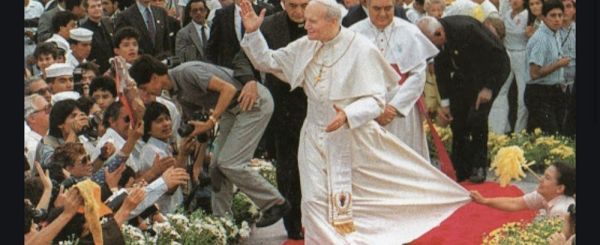3. I spoke of fructification, and I am also helped in this by the Gospel, when it proposes - a reading we recently encountered in the sacred liturgy - the simile of the barren fig tree, which is threatened with uprooting (Lk 13:6-9). Man must bear fruit in time, that is, during his earthly life, and not only for himself, but also for others, for the society of which he is an integral part. However, this operation of his in time, precisely because he is "contained" in time, must neither make him forget nor neglect his other essential dimension, of being that is oriented toward eternity: man, therefore, must bear fruit simultaneously for eternity as well.
And if we take this perspective away from man, he will remain a barren fig tree.
On the one hand, he must "fill with himself" time creatively, because the otherworldly dimension certainly does not dispense him from the duty to work responsibly and originally, participating effectively and in collaboration with all other men in the building up of society according to the concrete needs of the historical moment, in which he finds himself living. It is, this, the Christian sense of the "historicity" of man. On the other hand, this commitment of faith immerses the young person in a contemporaneity, which carries within itself, in a certain sense, a vision contrary to Christianity.
This anti-view has these characteristics, which I recall in a manner, albeit briefly.
Man today often lacks a sense of the transcendent, of supernatural realities, of something that surpasses him. Man cannot live without some thing that goes further, that surpasses him. Man lives himself if he is aware of this, if he must always go beyond himself, transcend himself. This transcendence is deeply inscribed in the human constitution of the person.
Behold, in the anti-view, as I have said, contemporary, the meaning of man's existence therefore comes to be "determined" within the framework of a materialistic conception in order to the various problems, such as those of justice, work, etc.: hence arise those multiform contrasts between social categories or between national entities, in which the various collective egoisms manifest themselves. It is necessary, on the other hand, to overcome such a closed and, in the end, alienating conception, contrasting it with that broader horizon that right reason and even more so the Christian faith already let us glimpse. There, in fact, problems find a fuller solution; there justice takes on completeness and implementation in all its aspects; there human relationships, excluding all forms of selfishness, come to correspond to the dignity of man, as a person on whom the face of God shines.
[Pope John Paul II, to the young people of Turin, April 13, 1980]












